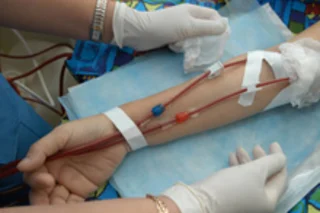Blood vessels grown from patients' own skin cells have been used to make the process of dialysis safer and easier for people with failing kidneys, and researchers say the process may one day be used to
custom-produce blood vessels for patients with circulatory problems in their hearts or legs [AP].
Kidney patients need frequent dialysis to filter their blood, and that requires
a vessel, or shunt, to connect them to dialysis machines. This can be made from their own vessels. But because dialysis is done so regularly, kidney patients often run out of healthy vessels and need an artificial one, often made out of [Gore-Tex]. Those are prone to infection and inflammation [AP].
For the new study, published in The Lancet, researchers took small snips of skin from the backs of ten patients' hands and extracted
two cell types -- fibroblasts from the skin which provide the structural backbone of ...














